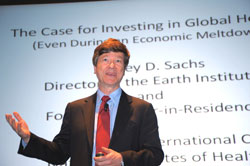Sachs urges systems approach to global health
May - June, 2009 | Volume 8, Issue 3

Health economist and Fogarty Scholar-in-
Residence Dr. Jeffrey Sachs, tells an overflow
audience at NIH, "We still have the need, we
still have the opportunity" to improve global
health. "The question is whether we can get
organized."
All the recent progress in taming infectious diseases will mean little without systemic changes in the design, financing, management and delivery of health care around the world, economist Dr. Jeffrey Sachs told an NIH audience recently.
Sachs, a best-selling author, Columbia University professor and Fogarty scholar-in-residence, reviewed elements of epidemiology, politics and economics - all operating against a backdrop of extreme poverty - to explain a grim global health reality.
Citing a $35 billion "financing gap" - or one-tenth of 1 percent of "rich world wealth" - between current conditions and what is needed to improve health in low-income countries, Sachs said, "We still have the need and we still have the opportunity to create a true global response and a true commitment to health for all ... The question is whether we can get organized."
The lecture, which filled the Masur Auditorium, was part of the capstone of Fogarty's year-long 40th anniversary celebration and was cosponsored by the Foundation for the NIH.
Sachs said public health ought to be built from a "global system design" analogous to the world's air safety practices; based on a set of rigorous and uniform standards applied in all countries - from the airport to the traffic control system, maintenance and insurance.
"We need training programs like Fogarty's" to create cadres of professional community health workers and public health managers, he said. "This was once called by the IMF and the World Bank 'bureaucracy.' That's not 'bureaucracy,' it's creating systems."
"We still haven't figured out the real proportionality of life on the planet," he said, noting that while Western institutions have given $5 trillion in "stimulus and bailouts" in the past year, "We haven't given a penny to the poorest of the poor. ... We not only can afford, in partnership with others, to assure health for all, there is no way we can afford not to do it" lest developing-world problems "come here with a vengeance."
"We have a full worldwide pandemic of instability, of poverty, of mass migration, of violent conflict, of hunger and of new and re-emerging pathogens in a tightly connected world," he warned.
"With all of our knowledge ... and with all our wealth I believe we can do better."
To view Adobe PDF files,
download current, free accessible plug-ins from Adobe's website.